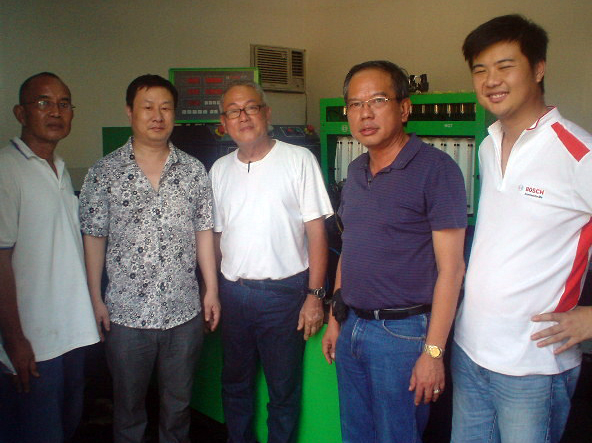From a micro-small company of 12 people in 1995, it is almost 10 times its original size with three plants in Northern Mandaue, Central Cebu, and Southern Talisay, expertly undertaken by more than 100 competent staff and certified mechanics.
What started as a trading company selling automotive and truck spare parts went into the remanufacturing and overhauling of automotive and marine engines in 2002.
Now complementing the engine remanufacturing and overhauling business in its accreditation as a Bosch Diesel Service Workshop for testing (or should we say calibration) of diesel fuel injection pumps and injectors.
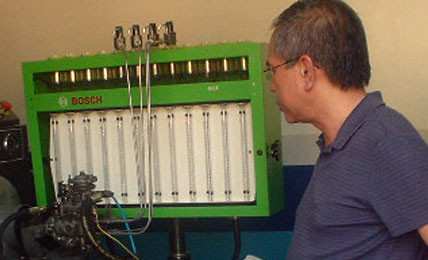
With the ISO certification and Bosch accreditiation, it would be safe to consider Wellmade Motors as one of the most professionally-run and technologically-advance metalworking shop and car check center in the Philippines.
Trivia 1: Do you know that TüV Rheinland Philippines was contracted to do third-party audits for continuous management process improvements? Its just one of the many ways Bosch maintain the high quality standard of the Bosch Service network.
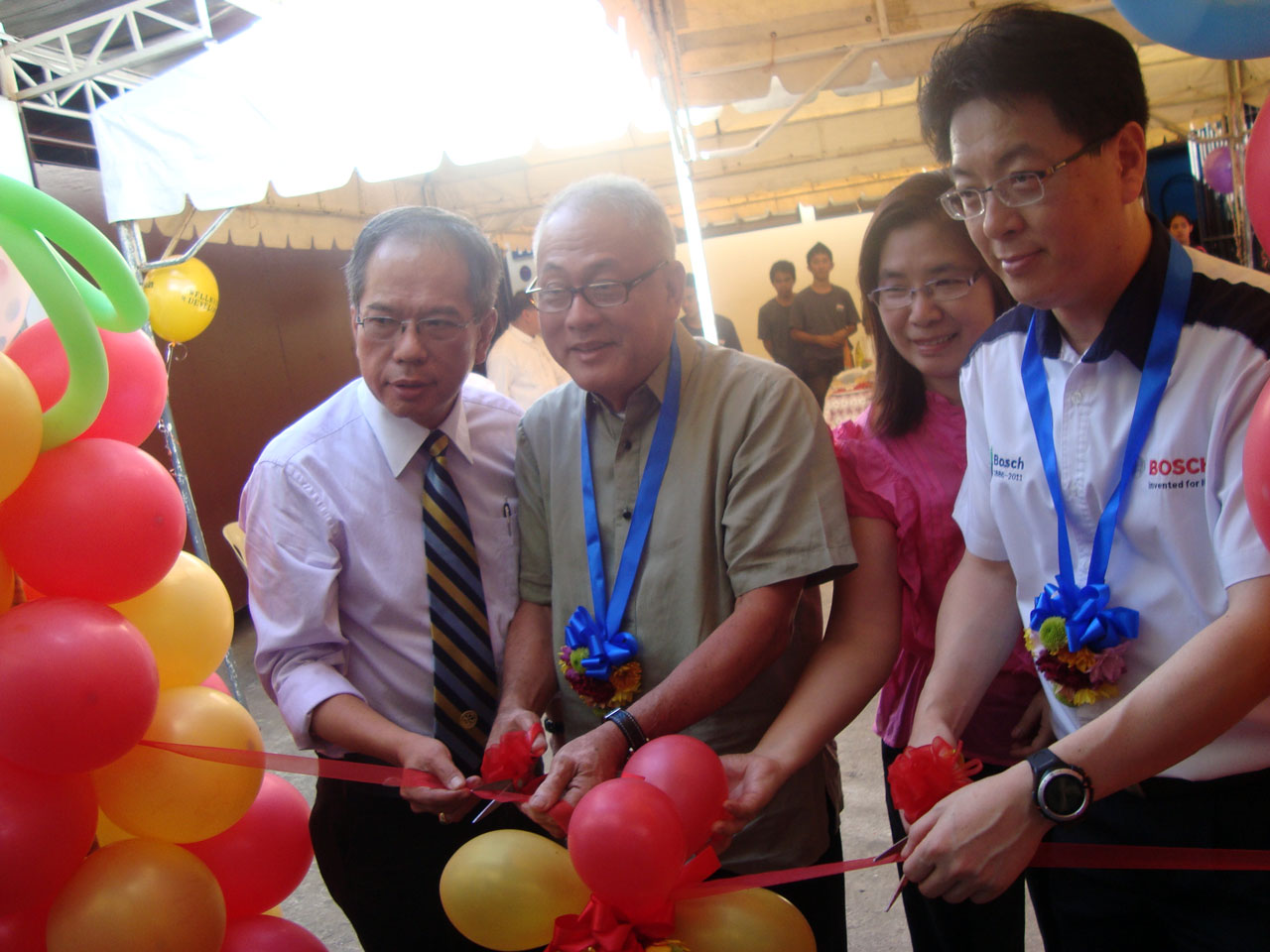
Bosch Network Development Officer Jose Alejandro "Peewee" Ligot officially presenting the Bosch Accreditation Certificate for a Bosch Diesel Service workshop to Mr. Philip Tan. Wellmade Motors is now proudly a part of the biggest service organization in the world, and one of just five in the Philippines.
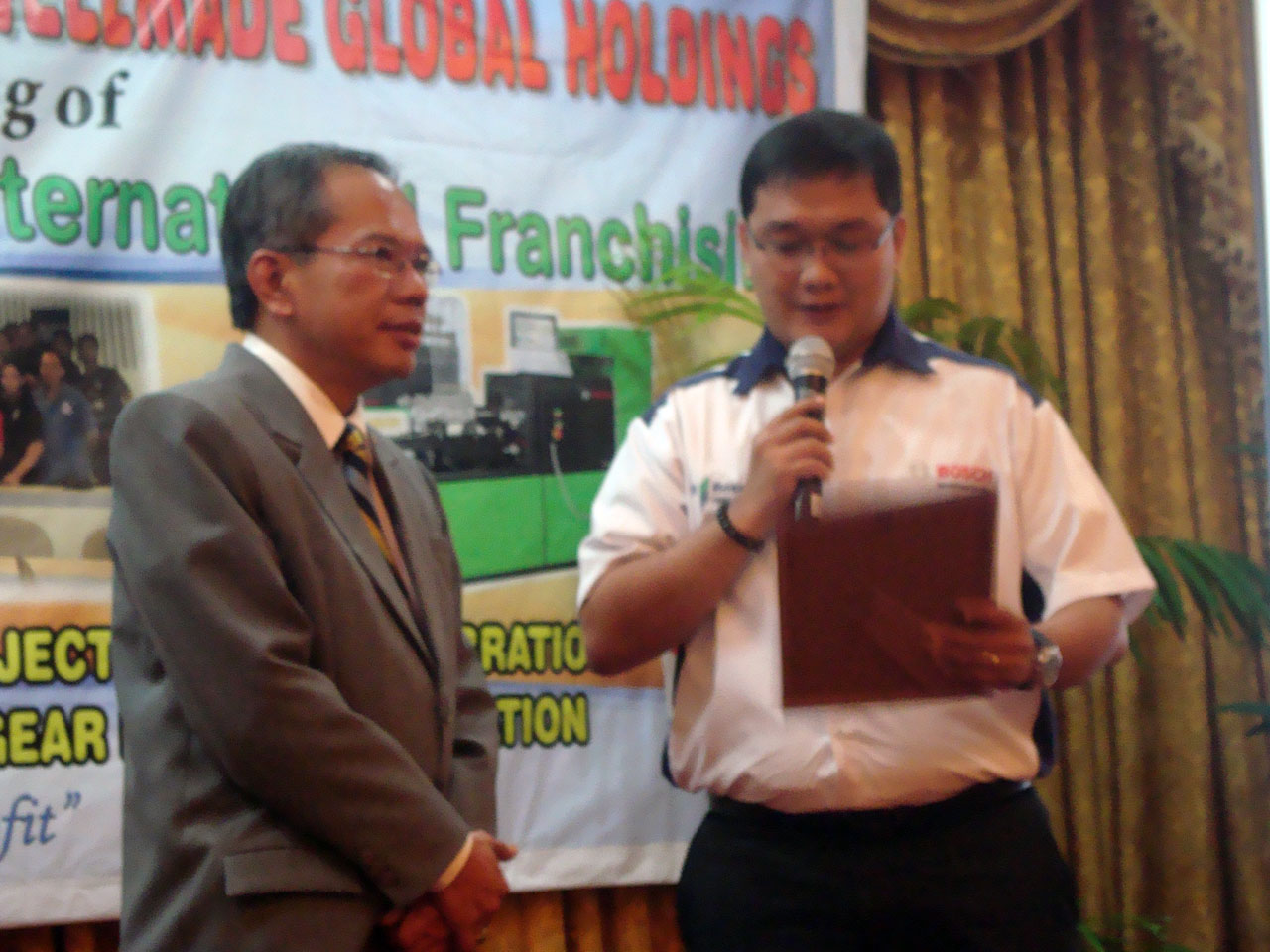
Trivia 2: Wellmade Motors is a 2009 Productivity Olympics awardee of the Department of Labor and Employment.
Need diesel service that strictly follow established methods of the ISO level?
WELLMADE INNOVATIVE TECHNOLOGIES, INC.
Lawaan I,
Talisay City, Cebu
telefax (032)239.0244
web www.wellmade-motors.com
MR. PHILIP TAN, Owner
https://malabon-diesel.com/diesel-news2/item/82-wellmade-motors-eps-619.html#sigProId3dad50182e
Touching Lives Beyond Profit
A Wellmade Story on Productivity
Speech of Sec. ROSALINDA DIMAPILIS-BALDOZ in the Awarding Ceremonies of the 2011 Productivity Olympics at Bayleaf, Intramuros, Manila on 27 October 2011, 9:00am
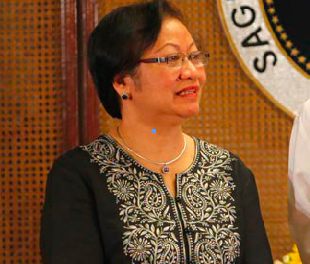
Let me start by sharing with you a story on productivity.
In 1988, an entrepreneur founded a company somewhere in southern Philippines which engaged in trading and engineering services. Using his vast training and experience in engineering works, he succeeded to find his business niche. With the launching in 1995 of its innovative precision engineering workshop, the company quickly became one of the biggest and modern workshops in the country. But there were growing up pains.
Four years later, problems started to come in. Tardiness in the shop was getting out of hand. Occurrences of machine breakdowns were increasing. Deliveries were delayed; incidence of non-conformance to quality standards and idle machineries and equipment became a major concern. The impact was a nightmare for a start up business: materials wastages, foregone revenues and worst, financial losses in the millions of pesos.
Then came ISTIV, the value-based productivity improvement program of the National Wage and Productivity Commission. Instead of resorting to punitive disciplinary action to rectify the situation, The Company launched a program espousing a culture of discipline and honesty in the shop. Slowly but surely, this approach had created an atmosphere of cooperation between labor and management. The positive impact of this renewed social cooperation started to unravel. Bundy clocks and security guards were eventually removed, and body frisking before the employees could leave the company premises became a thing of the past. Tardiness dropped by 95 percent. Employee morale started to improve.
To address machine breakdowns, the management formed a committee composed of machine operators, supervisors and maintenance group which developed and implemented a program dubbed, “This Machine is Mine”. It aimed to instill a sense of ownership among workers to ensure the proper use and maintenance of machines and equipment. Alongside other affirmative action, this program has produced positive outcomes which started to show in corporate performance.
These outcomes could be said to be inclusive because all employees including the managers and supervisors jointly shared their benefits. For instance, employees received a monthly bonus ranging from a minimum of 20 percent to as high as 500 percent of their monthly salary. Admirably, 5 percent of the company’s work force is physically-handicapped. Think about good corporate citizenship.
Twenty-one years later, in 2011, the company successfully franchised its business in Davao and Malaysia, with Bohol and General Santos City emerging as additional expansion sites. For this feat, the company is probably the first company in the world to engage in franchising machine shop business both at the local and international markets. The road to further business expansion is now paved with exciting opportunities.
That company, true to its name is Wellmade Motors and Development Corporation, owned by Mr. Philip Tan, based in Cebu City and was one of our 2009 Productivity Olympics awardees.
Ladies and gentlemen, champions and exponents of productivity improvement initiatives, this is what Productivity Olympics is all about: It recognizes that productivity improvement creates a virtuous circle where all stakeholders benefit, from workers with decent work and incomes creating products and services that meet customers’ expectations, to management that are able to meet corporate bottom lines and deliver desired business outcomes to shareholders, to customers that enjoy products and services of superior quality at reasonable and affordable prices, to the community that benefits from good corporate performance primarily through taxes and the practice of good corporate citizenship, and to the whole economy that is made more competitive by productive and competitive workers and enterprise, the competitiveness of enterprises and our economy as a whole.
These are the individual, corporate and societal outcomes which our Productivity Olympics, now on its fourth year, seek to demonstrate and celebrate. That is why our criteria for selecting the national winners consist of Business Excellence and People Development, now renamed Resource Management, to give particular focus on the enterprise’s efforts in managing the totality of its resources, including systems technology and green program. These criteria reflect DOLE concerted efforts and strategic programs on enterprise competitiveness and employment. For instance, the Business Excellence criterion covers the extent of people participation in the design and implementation of productivity improvement programs, their impact on employment, and the adoption of gain-sharing schemes for the workers who are the primary creators of economic value and pillars of all productivity enhancement initiatives.
On the other hand, the Resource Management criterion puts premium on the impact of productivity on business performance, expansion and growth, workers’ welfare, and now, systems technology and green initiatives. The point to make here is that productivity is a key factor to ensure progressive workplace practices that sustain better workplaces where social dialogue and social partnership underpin workplace relations, and where better working conditions are continuously being improved so that the needs of the consuming public are met and societal benefits are mobilized toward greater wealth creation that is inclusive, sustainable, and protective of the environment.
The overarching goal of President Aquino’s 22-point labor and employment agenda is to invest in our top resource, our human resource, to make the Philippines more competitive and to promote industrial peace based on social justice. Since human capital formation is the foundation of every productivity improvement initiative, we must sustain our joint efforts to build up the skills of our workers. I am happy to note that our past and present awardees have put premium on human resource development. This is the only way to go, for any productivity improvement program will not succeed unless it is firmly founded on skills enhancement and development of our workers. And productive and competitive enterprises can only thrive and achieve its growth potential in a climate of industrial peace based on social justicce.
President Aquino’s Social Contract with the Filipino People, embodied in the Philippine Development Plan 2011-2016, and reflected in our own Labor and Employment Plan 2011-2016, envisions inclusive growth that massively creates local jobs, sustains real economy enterprises, produces decent work outcomes, and empowers our people to rise above poverty.
The Plan recognizes sustained increases in labor productivity growth in real economy enterprises as key to poverty reduction and improvement in living standards. We all recognize that productivity growth is a significant barometer of poverty reduction, and in fact is one of the four indicators corresponding to the Millennium Development Goal of eradicating extreme poverty and hunger. But for this to happen, productivity gains must be inclusive and shared equitably so that our workers must have the economic means and capacity to spur domestic consumption, thereby stimulating economic growth and making significant dent on poverty reduction.
Our awardees belong to micro, small and medium enterprises (MSMEs) which are the backbone of our economy. This productivity awards is our way of properly recognizing the important role MSMEs play in nation-building and national development. As a labor-surplus economy characterized by low agricultural productivity, it is a must for us to improve the productivity and competitiveness of our MSMEs, especially those in agro-business. And we can enhance agricultural productivity and outputs through investments in irrigation, farm-to-market roads, farm technologies, and even farm inputs and implements. The goal is to improve the livelihoods of the rural poor so that we will be able to address the problem of rising food prices.
Needless to state, improving productivity in our MSMEs is crucial in our efforts to enhance the productivity of our economy in general. As our awardees have shown, boosting productivity in small-scale activities and mainstreaming them into the formal economy is an effective way to reduce vulnerable employment and the numbers of working poor. I call on you deepen and widen the net of your HR development programs by expanding and sustaining training opportunities for our workers in MSMEs.
Earlier, I spoke of sustained productivity growth that is inclusive because it benefits not only workers and enterprises, but also the consumers and the community in general. When we speak of productivity growth, we naturally speak of financial returns such growth brings to enterprises and workers. That’s why we have the so-called productivity-based wage adjustments and other financial benefits. This is quite to be expected, especially among our workers who make sustained productivity growth possible.
Which brings me now to our ongoing efforts to introduce strategic policy reforms in the country’s wage determination system. As envisioned, this reform seeks to minimize the unintended outcomes of mandated minimum wages, improve the coverage of vulnerable sectors, and promote productivity improvement and gain-sharing. The reform consists of a fixed “floor wage” or entry level for new entrants and low-skilled workers and a flexible wage above the floor based on productivity and performance of the industry and enterprises, which may be negotiated between the employer and the workers.
This policy reform is dictated by recent findings that minimum wages tend to be close to average wages, although with large regional variations, typically between 80–120% of average wages. As a result, this will give rise to disincentives for both skilled and unskilled workers, in the process disrupting the economy and our employment program. Likewise, there is evidence that wage bargaining is influenced by wage decisions, such that minimum wages discourage collective bargaining.
I strongly believe that the two-tiered wage reform policy will address these gaps by providing more effective protection to low-paid workers through a genuine wage floor and encouraging wage bargaining along productivity growth. On a more personal note, I also believe that this reform is fundamentally about the justness of providing our lowly-paid workers with minimum wage which is a floor wage, and threrefore, no worker should be paid below it, otherwise, it is not only illegal but also immoral.
I am pleased to note that our social partners in the workers and employers’ sectors have already accepted in principle this reform. Right now, the fine-tuning focuses on the manner of its implementation, which is being done through technical studies and multi-sectoral consultations. Last year, we sent a tripartite technical mission to Singapore to study the experiences and good practices on productivity-based pay. With the support again of the ILO, we also sent a technical mission to Melbourne, Australia last week for the same purpose. This time, we actively engaged some of our wage board personnel to make these study and learning missions more inclusive.
I therefore expect the NWPC to roll out as soon as possible a time-bound and outcomes-based plan to cascade the principles and mechanisms of the two-tiered wage reform policy down to our regional wage and productivity boards. Our priority right now is to widen the scope of sectoral consultations on this policy reform so that we can gather as many views and inputs as possible from all stakeholders. The success of this reform lies in our ability to mobilize the widest-possible support for it effective implementation. Now, we have found a formula-based system that links productivity with wages and vice versa, we can look for more exciting and more challenging Olympics ahead of us.
On this note, let me congratulate our 2011 Productivity Olympics winners and awardees for a job well done. You are now in a better position to propagate the value of productivity improvement. Go out and share your experiences with your fellow MSMEs and inspire them to follow your lead. Demonstrate to your colleagues that productivity improvement has a solid business case because it raises both workers and enterprises’ competitiveness, and makes possible the enhancement of workers’ skills, the improvement of workplace conditions, and the deepening of workers’ participation in decision-making processes in the enterprise. Everybody is a winner in productive and competitive enterprise.
In behalf of the Commissioners of the National Wages and Productivity Commission which I chair as the Secretary of Labor and Eploymment, its highly capable and professional Secretariat, the Regional Tripartite Wage and productivity Boards, and the distinguished and hardworking members of the Panel of Judges which I also chaired, i say thank you very much.
God bless.
More power to the Productivity Olympics!
Mabuhay tayong lahat!

